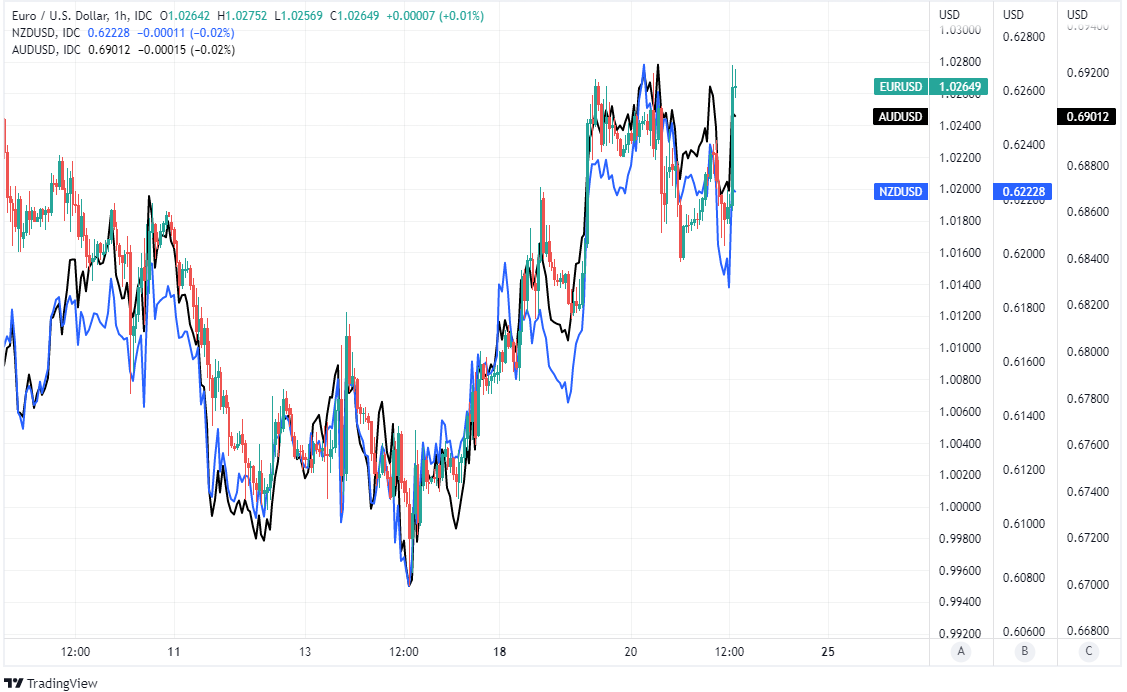Euro Boosted as ECB Wins Over a Sceptic Market
- Written by: James Skinner and Gary Howes

© European Union, reproduced under CC licensing
The Euro to Dollar exchange rate rose on Thursday after the European Central Bank (ECB) appeared to convince a sceptic market that it can bring down inflation by lifting Eurozone interest rates without driving the Euro Area's more fragile economies toward wreck or ruin.
Europe's single currency came close to retesting the 1.03 handle against the Dollar when rallying in the wake of Thursday's European Central Bank decision to call time on the era of negative interest rates in Europe without any further adue in a policy outcome that surprised parts of the financial markets.
The ECB raised by 50 basis points all of the interest rates charged or paid on its main refinancing operations, marginal lending facility and deposit facility, lifting them to 0.50%, 0.75% and 0.00% respectively in a decision that marks a decisive end to the period of negative interest rates in Europe.
"Further normalisation of interest rates will be appropriate. The frontloading today of the exit from negative interest rates allows us to make a transition to a meeting-by-meeting approach to our interest rate decisions. Our future policy rate path will continue to be data-dependent," President Christine Lagarde said.
Thursday's decision was less of a surprise than it might have been if not for earlier media reports suggesting the ECB would debate a 50 basis point increase this week as opposed to the smaller step of 25 basis point rise in interest rates that had been all but pre-announced back in June.
Above: Euro to Dollar rate shown at hourly intervals alongside AUD/USD and NZD/USD.
Compare EUR to USD Exchange Rates
Find out how much you could save on your euro to US dollar transfer
Potential saving vs high street banks:
$2,750.00
Free • No obligation • Takes 2 minutes
But financial markets had stopped short of fully pricing-in this larger step and many analysts had remained unconvinced that the ECB could circumvent on Thursday the risks stemming from the effect that raising interest rates may have on debt sustainability in some parts of Europe.
Markets had worried about what could become of some Southern European bond markets as the ECB's interest rates begin to rise, leading the Euro and bonds to be sold widely following June's announcement that borrowing costs would likely be increased from July.
But the Euro fared better on Thursday and despite the ECB raising all of its interest rates in a larger increment than expected by economists and markets.
"This decision is based on our updated assessment of inflation risks and the reinforced support provided by the TPI for the effective transmission of monetary policy," President Lagarde said in introductory remarks at the press conference.
Thursday's Euro rally may have been a reflection of relief, if not market satisfaction with the ECB's Transmission Protection Instrument (TPI), which is designed to facilitate a normalisation of its monetary policy - through increases in interest rates - by protecting vulnerable countries' bond markets from undue selling as borrowing costs rise.
Above: Euro to Dollar rate shown at hourly intervals alongside U.S. Dollar Index.
"The Transmission Protection instrument is intended to faciliate and enhance transmission of our monetary policy stance in particular circumstances that we will address and the ECB will be capable of doing that," President Christine Lagarde told reporters in Thursday's press conference.
"And the ECB is capable of going big for that," she added.
Market concerns about debt sustainability can lead to punishing losses for some countries' bond markets that would, if taken to extremes, hinder the ECB's ability to lift interest rates in the manner necessary to combat inflation.
Inflation has risen to new records this year due to Russia's invasion of Ukraine and its impact on energy and food prices, among other things, leaving central banks with little choice but to begin withdrawing the pandemic period stimulus provided through low interest rates and things like quantitative easing.
Above: Euro to Dollar rate shown at daily intervals alongside SEK/USD.
Compare EUR to USD Exchange Rates
Find out how much you could save on your euro to US dollar transfer
Potential saving vs high street banks:
$2,750.00
Free • No obligation • Takes 2 minutes
The ECB said on Thursday that any government bond purchases carried out through its Transmission Protection Instrument could be in unlimited amounts with no "ex ante" restrictions on the mechanism's operation.
This would, in turn, enable the ECB to lift its interest rates faster and further than otherwise, which is positive for a Euro currency that has come under pressure over the last 10 months in which many other central banks around the world have lifted their own rates sharply.
But while Thursday's policy decision was supportive of the Euro, the ECB also made clear that future policy decisions will be dependent on inflation, employment and GDP figures emerging in the months ahead, which leaves question marks lingering over the outlook for the time being.
"Economic activity is slowing. Russia’s unjustified aggression towards Ukraine is an ongoing drag on growth. The impact of high inflation on purchasing power, continuous supply constraints and higher uncertainty are having a dampening effect on the economy," President Lagarde said on Thursday.
"At the same time, economic activity continues to benefit from the reopening of the economy, a strong labour market and fiscal policy support. In particular, the full reopening of the economy is supporting spending in the services sector. As people start to travel again, tourism is expected to help the economy in the third quarter of this year," she added.






